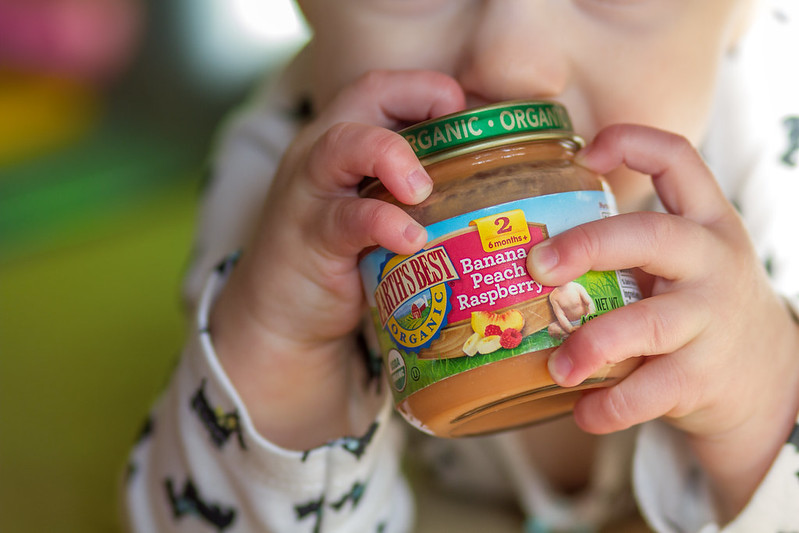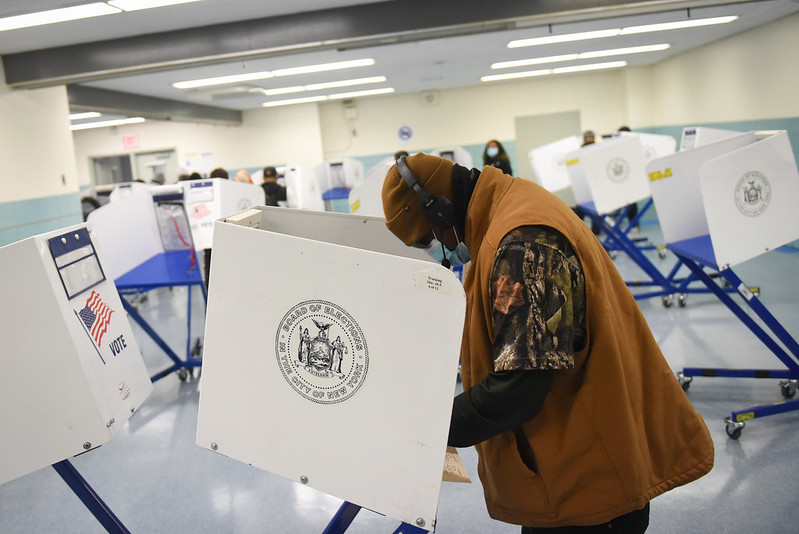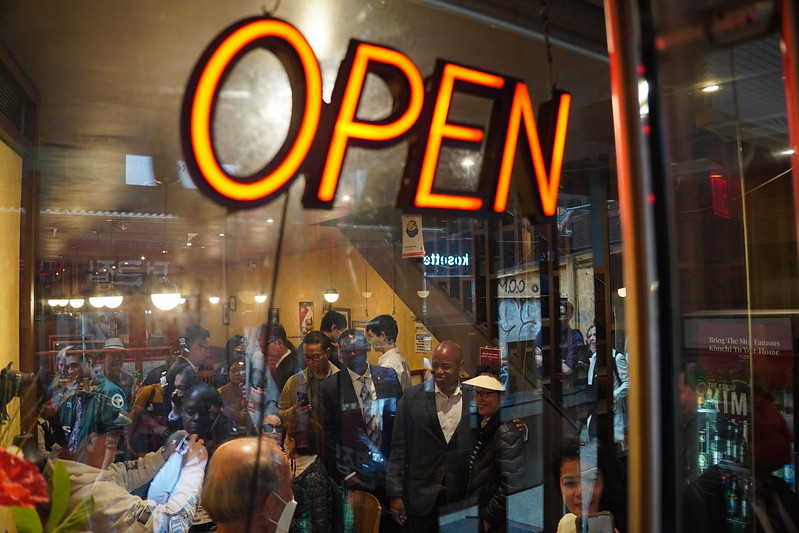FDA Not Aggressive Enough as Multiple New York Baby Food Companies Tainted with Heavy Metals

Baby food (photo: @kgregory)
On February 4, 2021, a congressional report exposed four major baby food companies for allowing tremendous concentrations of arsenic, cadmium, lead, and mercury in their products. Naturally, shortly after finding out about the sheer carelessness of the manufacturers, parents nationwide became outraged and began filing lawsuits against the responsible companies.
Among the most recent lawsuits, there is one concerning HolleUSA, a European baby food company founded in 1934. This manufacturer's products are sold in the United States by Jet Set Go Baby, headquartered in New York City. As is the case of multiple other baby food companies, the class-action lawsuit alleges several products by HolleUSA are contaminated with dangerous heavy metals.
At the request of the New York State Attorney General's Office, Brooks Applied Labs tested 18 samples of HolleUSA's products in December of last year for the presence of heavy metals. The lawsuit states that all 18 baby food samples had "varying high levels" of heavy metals. "Not a single sample from Defendant did not contain heavy metals," the case states. The lawsuit accuses the company of "deceptive representations and omissions" for products such as Holle Goat Milk Toddler Drink and Holle Organic Panda Peach, Fruit & Grain Puree.
Three Other New York Based Baby Food Companies Disregard the Safe Limits for Heavy Metals
Three companies whose baby food was found contaminated with mind-blowing concentrations of heavy metals by the U.S. House of Representatives Subcommittee on Economic and Consumer Policy are also headquartered in New York – Beech-Nut, Hain Celestial Group, and Nurture. However, once Beech-Nut issued a recall on one lot of Beech-Nut Stage 1, Single Grain Rice Cereal, it also exited the baby food market. The baby food company used to have its headquarters in Amsterdam, New York, and one of the most disturbing findings is that it used ingredients with over 900 parts per billion (ppb) arsenic, while the safe limit is 10 ppb.
Another baby food company that agreed to participate in the congressional investigation, Hain Celestial Group, is headquartered in Lake Success, New York. It sells baby food under the brand name Earth's Best Organic and was discovered to allow products containing 352 ppb lead to go on the shelves when the maximum limit is 5 ppb. Nurture also has its headquarters in New York. According to the congressional report, this baby food company, which sells products under the brand name HappyBABY, used ingredients with 641 ppb lead.
Exposure to Heavy Metals and Child Development
Exposure to such enormous concentrations of heavy metals from infancy is associated with a risk of autism, among other neurodevelopmental disorders and problems. Once inside developing children's bodies, arsenic, cadmium, lead, and mercury act as neurotoxins, wreaking havoc on their brain and nervous system. Children are more vulnerable to experiencing the negative health effects of exposure to heavy metals because they have a greater nutrient uptake rate by the gastrointestinal tract and underdeveloped detoxification systems.
Since 2007, the incidence of autism has increased by roughly 1%, and 1 in 44 children born in or after 2010 will develop the disorder. Exposure to heavy metals from a young age is also linked to cognitive damage, a lower IQ, behavioral abnormalities, ADHD, learning disabilities, and speech, hearing, and visual impairment. New York ranks third among states with the highest special education rates, with 17.3% of children enrolled in special education.
The FDA’s Closer to Zero Plan, Not Radical Enough
Soon after the Subcommittee on Economic and Consumer Policy made available the congressional report, the Food and Drug Administration (FDA) came up with the Closer to Zero plan, which is meant to "reduce exposure to arsenic, lead, cadmium, and mercury from foods eaten by babies and young children to as low as possible." Nevertheless, the agency's strategy is quite problematic and has numerous shortcomings. Perhaps the most frustrating thing about the Closer to Zero plan is that it would be finalized in 2024 or later, in the context in which infants and toddlers urgently need clean, non-toxic food.
The Closer to Zero plan has four steps, out of which the first two – "evaluating the scientific basis for action levels" and "proposing action levels" – can be skipped. The FDA already knows the safe limits for the four heavy metals from the Baby Food Safety Act of 2021. The bill was proposed on March 25, 2021, by Congressman Raja Krishnamoorthi. It will immediately set maximum limits for arsenic, cadmium, lead, and mercury in baby food throughout the United States if it becomes law.
Only the third step of the Closer to Zero plan yields some worthwhile action – assessing the achievability and feasibility of the action levels. The FDA should make sure all baby food manufacturers across the country have the means to implement measures that minimize the content of heavy metals in their products, such as sourcing their raw ingredients from crops grown on soil with a low arsenic content and using food strains that are less likely to absorb heavy metals.
Other notable shortcomings of this strategy include failing to consider the cumulative impact of heavy metals on children's neurodevelopment and not being consistent in making parents aware that there is no safe lead concentration in children's blood. Many people, as well as authorities, are discontent with the Closer to Zero plan. On October 21, 2021, 24 Attorneys General petitioned the FDA to prioritize establishing safe limits for heavy metals in baby food. They also expressed their dissatisfaction with how the agency is tackling the problem, saying that the FDA should take more aggressive measures.
The Baby Food Safety Act of 2021 - A Glimpse of Hope for Parents
The Baby Food Safety Act of 2021 would be a much more effective and viable alternative to the Closer to Zero plan, as the safe limits for heavy metals would become effective immediately, and it would also make it mandatory for the FDA to become more involved in supervising the baby food industry. This bill would also oblige facilities that handle baby food to have controls and plans to ensure their products comply with the safe limits on heavy metals. Finally, the Baby Food Safety Act of 2021 would have the Centers for Disease Control lead awareness campaigns on the risks of heavy metals in baby food.
***
Jonathan Sharp is Chief Financial Officer at Environmental Litigation Group, P.C., Headquartered in Birmingham, Alabama. The law firm specializes in toxic exposure and represents clients across numerous other mass torts nationwide. On Twitter @ELGBirmingham.
***
Have an op-ed idea or submission for Gotham Gazette? Email This email address is being protected from spambots. You need JavaScript enabled to view it.
New York's Democracy is Broken; Albany Leaders are to Blame

Lonely voting (photo: Michael Appleton/Mayoral Photography Office)
Our federal democracy is broken.
The Supreme Court is poised to overturn Roe v. Wade; five of nine justices were nominated by presidents who lost the national popular vote. Those justices have thrown their hands up when asked to address extreme partisan gerrymandering, then used their pens to gut what’s left of the Voting Rights Act.
Gerrymandering locks in minority power nationwide while the filibuster does the job in the Senate, so widely popular policies like universal background checks for gun purchases are left undone.
As we look to Albany to shore up abortion access and gun control, our blue bastion should also be a national model for a healthy democracy. But — traceable directly to a lack of pro-democracy energy in our State Legislature — New York is anything but.
Our failure to deliver fair, inclusive, well-run elections makes us a national laggard at the very moment we must be leading, and the consequences are far more than embarrassment. Our impoverished democracy disenfranchises voters and reduces the responsiveness of our legislators to the oversight of New Yorkers.
First, there is the fiasco surrounding the tossed-and-redrawn Congressional and State Senate district maps and choice to hold two primary days, a court-ordered August primary for those races and a June primary for Assembly, statewide, and other races. Good government groups affirm that the split primary will disenfranchise voters beyond our already dismally low turnout, a boon to incumbents but a loss to New Yorkers. State leaders chose not to consolidate the primaries in August though they had time to do so after the court order.
The hydra-headed debacle was all of Albany leaders’ own making. Beyond drawing the maps that have been ruled unconstitutional, they’re responsible for the state’s top court being led by a bloc far more conservative than the state is.
Chief Judge Janet DiFiore is a former Republican appointed by then-Governor Andrew Cuomo. She wrote the decision after the 4-3 ruling against the Democratic district maps, which got its decisive vote from Madeline Singas — a conservative Democrat who Cuomo pushed through. All but ten Democratic state senators voted to confirm her over progressives’ objections to her record; with the redistricting decision, those Democrats’ neglect of the courts came home to roost.
But legislators’ anti-democratic actions aren’t limited to making the courts their Lucy with the football of cushy districts. The coming split primaries will happen within a status quo of anti-voter laws and unprofessional administration, thanks to both past negligence and current disregard from legislators.
Last year, Democrats did nothing to support the passage of constitutional amendments to enable same-day voter registration and no-excuse absentee voting in New York — critical, common-sense, pro-voter laws that exist all over the country to drive more turnout. Republicans spent money and campaigned against the changes; in spite of Democrats’ 2-to-1 voter registration advantage, the amendments failed by double digits.
The 2021 election was the latest in a long line of failures of election administration in New York, and in particular New York City. Our Board of Elections fumbled the first tabulation of ranked-choice voting results — undermining confidence in the vote at a moment when flames of the Big Lie are fanned by any lapse in election integrity — after having to replace 100,000 absentee ballots during a mishap in 2020. And the list goes on.
Since then, State Senator Liz Krueger has been seeking to professionalize the New York City Board of Elections, but the bill to do so didn’t pass during the just-ended legislative session; it lacked support in the Assembly after passing the Senate.
The session wasn’t all bad. The hard-won John R. Lewis Voting Rights Act of New York will serve as a bulwark against discrimination and voter intimidation. On the other hand, a bill to move more municipal elections to even-numbered years to boost turnout failed.
Albany insiders — and especially the Assembly’s establishment, status-quo-biased incumbents — have little incentive to significantly improve elections and boost turnout in New York. Better turnout, and a more informed electorate, might upset their Big Applecart.
The Assembly’s undermining of democracy isn’t limited to which bills it won’t advance — it’s also reflected in a lack of transparency. Speaker Carl Heastie has restricted media access and limited public observation of the chamber’s proceedings, and his conference hasn’t forced more openness or accessibility.
The picture is dire, and a desiccated democracy isn’t the only consequence of the anti-democratic interests of our Assembly members. Ever since the 2018 election swept new insurgents into the State Senate — ousting the IDC Democrats who gave Republicans control of the chamber — good laws stall in the Assembly, where there is no significant coalition pressuring leadership to step off the beaten path.
Facing a further entrenchment of minoritarian power in Washington, we must demand more from our own legislators. If we want our federal representatives to kill the filibuster, expand the court, codify abortion and voting rights, and more, we must also make bold demands of our state elected officials: draw better districts, appoint better judges, build better courts and elections, advocate better pro-voter laws, and demand better from legislative leadership.
New York deserves more from Democrats in Albany, and American democracy needs more from New York.
***
Ryder Kessler led voter protection teams for Democrats during the 2020 presidential election and 2021 Georgia senate runoffs. He is now a candidate for State Assembly in District 66. On Twitter @ryderkessler.
***
Have an op-ed idea or submission for Gotham Gazette? Email This email address is being protected from spambots. You need JavaScript enabled to view it.
Our Path to a Safer New York City Runs Through Affordable Housing and Small Businesses

Open for business (photo: Benny Polatseck/Mayoral Photography Office)
Our city has seen better days. You can’t walk a block in Chelsea without feeling like you’re in a graveyard of small businesses — I count six vacant storefronts on my block alone. The streets feel far less safe than they used to — a fight recently broke out next to my wife and me as we exited a coffee shop on 8th Avenue. And every day it feels like there’s more and more trash — everywhere.
In fact, these individual issues are all part of an underlying cycle of reduced street vibrancy that threatens to stick with us beyond the pandemic. Remote work began a process whereby reduced foot traffic in Midtown and the surrounding neighborhoods like Chelsea and Hell’s Kitchen led to vacant storefronts and undisturbed piles of trash, which led to reduced street safety, which led to further reductions in foot traffic. And on the cycle goes — unless we act.
Fortunately, the Adams administration recognizes this issue of vibrancy. Unfortunately, too large a portion of its attention is directed at forcing a return to work and at a nightlife-focused campaign to “let the city dance.” (Though I should note that I am supportive of some of the less attention-grabbing initiatives introduced by the mayor, such as proposals to make it easier for homeowners to create new rental units without additional parking requirements and for business owners to expand in their current locations.)
The core issue for communities in the middle of Manhattan is to restore vibrancy by building more livable neighborhoods for residents. The policy prescriptions aren’t easy, but they are achievable if we take three steps: First, we must increase foot traffic throughout workdays, weekday nights, and weekends by making New York’s housing affordable to a diverse array of residents, including young families; second, we need to tackle street safety head-on; and third, we have to fill in storefronts by disincentivizing landlords from accepting long-term vacancies and providing creative solutions to vacant space.
It starts with housing: unless it is possible for people to afford to live in our neighborhoods, then they cannot be livable. An innovative and progressive approach to fixing our housing crisis begins with passage of the Good Cause Eviction state bill that would cap rent increases and give tenants more power in negotiating their lease renewals. In the medium term, the state must continue increasing the supply of affordable housing to bring down prices, doubling down on efforts to convert unused office spaces and hotels into housing. Lastly, we should be on the search for the space and funding to build the next-generation Penn South or Manhattan Plaza — and ensure we remember the importance of those beacons of affordability.
Assuming reduced housing costs make it possible for people to live here, then the challenge becomes ensuring that people want to live here. And people want to live where the streets feel safe and dynamic. Today, homelessness has reached a crisis level, and our homeless neighbors are making an arguably, and sadly, rational choice to stay out of the unsafe shelter system. That must change, via significant investment in social services and job training to help homeless New Yorkers get on their feet.
It’s also critically important we take bold steps to keep guns off our streets; just last week, gunshots were fired near a Chelsea school, though thankfully no one was harmed. I applaud Governor Hochul and Democratic legislators for acting swiftly to strengthen “red flag” laws and raise the age for purchasing an assault rifle. We must do everything we can to stop gun violence and the pipeline of out-of-state guns that flood our streets. The safety of our neighborhood depends on it.
And finally, we arrive at solving the problem of vacant storefronts. Proposals like Assemblymember Linda Rosenthal’s bill to tax landlords for long-term vacant storefronts are a great start. Landlords should pay for the harm that they incur on neighborhoods when they leave commercial spaces vacant in the long-run by holding out for rents that are too high.
But let’s build off of this bill and ensure that we achieve the purpose of filling in our storefronts while retaining economic viability for mom-and-pop property owners: we can provide those same landlords with the opportunity to waive the vacancy tax if they allow organizations like ChaShaMa to temporarily use the space for free as a “pop-up” art gallery or performance space. Every empty storefront is an opportunity to revitalize our streets, bring in small businesses, and find a mutually beneficial arrangement for the community and its landlords.
We can’t sugarcoat it: the city is in a tough spot. But we have an opportunity right now to change an undesirable “new normal” before it solidifies. Let’s stop begging workers to return to offices and let’s start making New York a place that everyone wants to live in again, including its current residents.
***
Harrison Marks worked in the Office of Management and Budget in the Obama Administration and lives with his wife and son in Chelsea. He is a Democratic candidate for the 75th Assembly District. On Twitter @HarrisonDMarks.
***
Have an op-ed idea or submission for Gotham Gazette? Email This email address is being protected from spambots. You need JavaScript enabled to view it.




